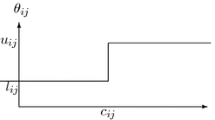Abstract
A minimum cost shortest-path tree is a tree that connects the source with every node of the network by a shortest path such that the sum of the cost (as a proxy for length) of all arcs is minimum.
In this paper, we adapt the algorithm of Hansen and Zheng (Discrete Appl. Math. 65:275–284, 1996) to the case of acyclic directed graphs to find a minimum cost shortest-path tree in order to be applied to the cost allocation problem associated with a cooperative minimum cost shortest-path tree game. In addition, we analyze a non-cooperative game based on the connection problem that arises in the above situation. We prove that the cost allocation given by an ‘à la’ Bird rule provides a core solution in the former game and that the strategies that induce those payoffs in the latter game are Nash equilibrium.


Similar content being viewed by others
References
Bergantiños, G., & Lorenzo, L. (2004). A non-cooperative approach to the cost spanning tree problem. Mathematical Methods of Operations Research, 59, 393–403.
Bergantiños, G., & Lorenzo, L. (2005). Optimal equilibria in the non-cooperative game associated with cost spanning tree problems. Annals of Operations Research, 137, 101–115.
Bharath-Kumar, K., & Jaffe, J. M. (1983). Routing to multiple destinations in computer networks. IEEE Transactions on Communications, 31(3), 343–351.
Bird, C. G. (1976). On cost allocation for a spanning tree: a game theoretic approach. Networks, 6, 335–350.
Borm, P., Hamers, H., & Hendrickx, R. (2001). Operations research games: a survey. Top, 9, 139–216.
Curiel, I. (1997). Cooperative game theory and applications: cooperative games arising from combinatorial optimization problems. Dordrecht: Kluwer Academic.
Dusnik, B., & Miller, E. (1941). Partially ordered sets. American Journal of Mathematics, 63, 600–610.
Fernández, F. R., Hinojosa, M. A., & Puerto, J. (2004). Multi-criteria minimum cost spanning tree games. European Journal of Operations Research, 158, 399–408.
Fernández, F. R., Hinojosa, M. A., Mármol, A. M., & Puerto, J. (2009). Opportune moment strategies for a cost spanning tree game. Mathematical Methods of Operations Research, 70, 451–483 (2009).
Fragnelli, V., García-Jurado, I., & Méndez-Naya, L. (2000). On shortest path games. Mathematical Methods of Operations Research, 52, 251–264.
Gómez-Rúa, M., & Vidal-Puga, J. (2011). Balanced per capita contributions and level structure of cooperation. Top, 19(1), 167–176.
Gondran, M., & Minoux, M. (1984). Graphs and algorithms. New York: Wiley.
Granot, D., & Huberman, G. (1981). Minimum cost spanning tree games. Mathematical Programming, 21, 1–18.
Hansen, P., & Zheng, M. (1996). Shortest path tree of a network. Discrete Applied Mathematics, 65, 275–284.
Marín, A. (2007). An extension to rapid transit network design problem. Top, 2, 231–241.
Voorneveld, M., & Grahn, S. (2002). Cost allocation in shortest path games. Mathematical Methods of Operations Research, 56, 323–340.
Wu, B. W., & Chao, K. (2004). Spanning trees and optimization problems. Cambridge: CRC Press.
Acknowledgements
The authors would like to thanks the very constructive comments of one anonymous referee that have helped to improve the quality of the paper. This research has been partially funded by the Spanish Ministry of Science and Technology projects MTM2007-67433-C02-01, MTM2010-19576-C02-01, and Junta de Andalucía grants FQM-331, FQM-5849 and P06-FQM-01366.
Author information
Authors and Affiliations
Corresponding author
Rights and permissions
About this article
Cite this article
Fernández, F.R., Puerto, J. The minimum cost shortest-path tree game. Ann Oper Res 199, 23–32 (2012). https://doi.org/10.1007/s10479-011-1043-8
Published:
Issue Date:
DOI: https://doi.org/10.1007/s10479-011-1043-8





